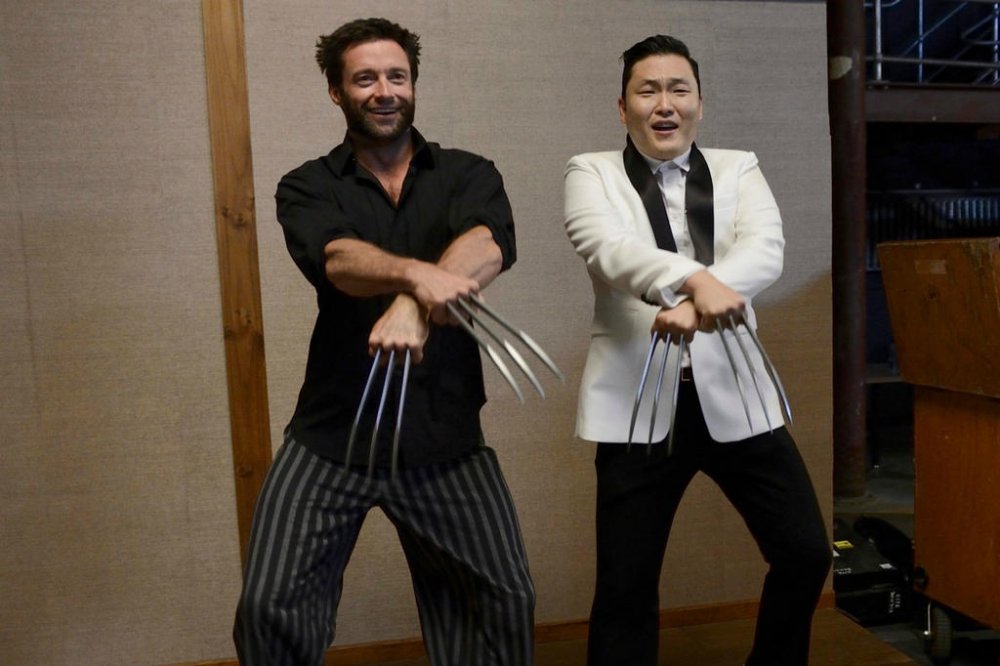Keegan Kolade O'Neil
EXPERIENCING AFRICA
I studied abroad in Ibadan, Nigeria. I chose to go there because I was studying Yoruba in college. Before leaving for Ibadan, I had become highly proficient in Yoruba, as I was already at a 4th year level in my second year of study .
Nigeria has a reputation that precedes it. My Nigerian professors didn't seem to want to scare me off, but they also didn't want to paint a bucolic picture that would prove false upon arrival. Many of my impressions came from the only travel book on the market for Nigeria (the Bradt guide), which suggested that Nigeria can be loud, confusing, and hot, but this chaos also binds the community together and makes Nigerians interdependent even more than many other nations on the continent. I certainly knew that I wasn't going to be having much of a vacation, but I was excited at the guarantee of a genuinely different cultural experience and, sometimes, an adventure. Nigeria is certainly known, also, for being a little dangerous, but that danger is not only blown out of proportion, but is also misapplied. Books and people will tell you about the past dictators and current armed robbers, but the real danger is the traffic. In fact, UW Madison eventually dropped my program a day before I was set to leave over safety concerns. I and my colleagues ended up leaving the university for a year and transferring our credits in.
My first impressions were unfortunately colored by my expectations, but soon those were overridden by the reality of Nigeria. I was incredibly paranoid for about a week, hearing sounds in the night that weren't there, some that were. The first night we arrived in Lagos, a man came to our door in the middle of the night and we were sure he wanted to rob us or do one of the many horrible things I had read in the guidebook or online. Similarly, I heard shouting and loud bangs in the city of Ibadan my first night there and couldn't sleep for fear that angry mobs were on their way to my door. I feel like a complete schizo thinking about my thoughts those nights, but, as I said, I was still trusting the word of westerners instead of my host family and teachers.
I couldn't believe how hot it was. The humidity kept me sweating all day. Having visited Mexico, Costa Rica, and Morocco before, I was still surprised at some of the infrastructural oddities of Ibadan. There would be no traffic lights or signs or lines on the roads, but everyone used cell phones all of the time. I also was not a big fan of Yoruba food at first, but that changed with time. Though I'm a vegetarian, I took a break while I was there and find that I can't help but suspend my own rules when I see a plate of suya in front of me.
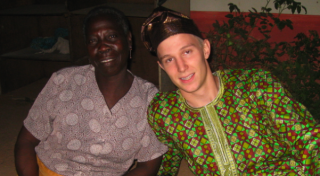
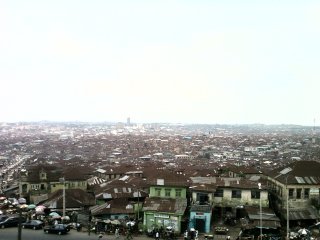
I lived with a professor and his wife. They had had six children, but they all had moved away, so I lived with the neighborhood 'grandma' and 'grandpa.'
We lived in the bottom flat of a three story building on the University of Ibadan campus far from most of the campus buildings. The other families included kids of all ages, some who acted as peers and others and soccer friends. I met one of my best friend from Nigeria, Bimbo Benson, living in that building. I'm afraid sometimes that people will think I'm exaggerating when I say that I could not have asked for a better set of host parents. They had incredible patience with my attempts to learn and adapt to the country while accepting that they could not always understand where I was coming from. By a month in, I felt as though I had always lived there. There may be a lot of stresses that come with living in Nigeria and adapting to a foreign culture, but my experience with Nigerians is one that proves their reputation as some of the most accommodating hosts in the world.
Regarding culture shock, I was more surprised at how different it was to come home. In Nigeria, I could remake myself on some level and knew that my experience and friendships were probably not permanent. When I came home, though, I felt as though there was a life I used to have that I should be fitting back into, but I couldn't. You can't come back from an experience like that and be the person your friends and family remember you as, but you can certainly be better if you adapt the lessons you learned there to the life you live here.
Living in a society outside of my own could be difficult at times, but finding good friends helped. I became very close with some of the students that were there with me, but I also made some very close Nigerian friends that I still talk to. I also felt very connected to my host parents, and it was just as hard to leave them by the end as it was to leave my real parents at the beginning. Sometimes it was hard to see if someone wanted to be friends because they liked me or because they thought they could get something from me. I think most people within the university, though, didn't know what to do with us. I think we had weird accents in their language that almost no one had heard before. I can't say enough about how well my host family fit me into their functions, including the lead up to my host sister's wedding. I unfortunately missed the actual event due to a bout with malaria, but I appreciated the work they put into getting me clothing with the family pattern and driving me around town to meet the extended family. I didn't feel as though I had a huge circle of friends, but I certainly had a family there.
I was in Ibadan to learn Yoruba, so there was definitely a language barrier for the first few weeks. I would say that I was both surprised at how well prepared I was, but also how hard it was to keep up with the things people said. I was going into my ninth semester of Yoruba, but all of that vocabulary didn't prepare me to hear 'O wa nibe' as 'O wa nbe,' as close as they seem. Overall, I was happy at how much I already knew, and also how much I learned about speaking, listening, and using local terms and colloquialisms. We also picked up a number of choice words from cab drivers that you wouldn't want your host mom to catch you saying, and at times, with the traffic in Nigeria, those turned out to be the most useful.
"Though I'm a vegetarian, I took a break while I was there and find that I can't help but suspend my own rules when I see a plate of suya in front of me."
I had so many memorable experiences that it's hard to choose just one. Additionally, some of the most memorable were memorable precisely because they were frightening. For example, the day we arrived in Ibadan, just as we came off of the highway ramp into the market, we heard loud popping: going back onto the highway we had just left was a truck of armed robbers speeding away followed by a Nigerian police truck firing assault rifles at them. Absolutely everyone in the market ducked and we all just looked at each other wondering what we had gotten ourselves into. That turned out to be a one-time experience, though, and every interaction I had with the police after that was incredibly courteous and pleasant. My other memory was sneaking off to Kano. My friend and I had been told in no uncertain terms that we were not to go to the North. This was just after Osama Bin Laden had been assassinated and a month after election riots had turned Kano upside down. We arranged to stay with a Couchsurfer in the city, announced to everyone that we were heading to Abuja for a week, and promptly boarded a bus to the North.
Finally, Nigeria taught me to stop worrying about what others think about me as I would stick out no matter where I was in the country.
It seems like we in the United States try to pretend around a lot of minor cultural taboos, but Nigerians will do what makes sense. Free cans of soda at the party? Bag a couple up and take them home. Feel like sleeping at a long meeting? Just do it.
I miss the constant adventure that walking out of my door was every day. I also miss greeting people that I saw on a regular basis while walking to school or buying food. Tangential relationships rarely exist in the US, but in Nigeria, they abound. I also miss getting extremely cheap food being made over an open fire and eating it under a tree. I miss how much value I put on things like getting food I liked, or playing a game of soccer with other students. Sometimes I even miss the smell of thick diesel smoke in the air as I'm walking down the side of the road. I miss the absolute insanity and cacophony out in the city, and yet other times I am happy to have so much peace and silence when I want it. I miss the kids knocking mangos off the trees with their long sticks.
I don't miss the sometimes maddening attention that my presence would draw in most situations. I also don't miss people trying to price gouge me because they profile me. I don't miss the Jurassic-sized cockroaches or the hour and a half of prayers and introductions that prefaced even the smallest meetings. I don't miss power outages or drinking all of my water out of plastic bags. I don't miss hand washing all of my clothes. I really don't miss malaria.
My advice for students studying abroad in West Africa is "DON'T OVER PACK". I came with a hiking bag and a backpack for nine months and there were still things I don't think I needed. Others checked two bags and packed toiletries for nine months. If you need something there, then obviously it will be sold there. I also encourage students to try to learn outside of the classroom. I learned more about Yoruba language and culture running around the city and jumping into cabs than I ever did in the classrooms.
I spent over a year in Nigeria and my little taste of Africa has only increased my appetite. If I had to sum up my experience in three words, I would say that my time in Nigeria was "hot, unpredictable and real".
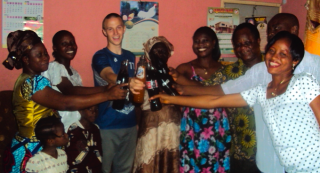
The bus took all night to get there, simply stopping on the road for a few hours round 3am, but playing ABBA's greatest hits the entire night. I will never forget trying to sleep in a bus seat somewhere outside of Kaduna as our driver is setting up his prayer mat on the road outside and Dancing Queen is playing at three in the morning. We ended up traveling all over Kano and seeing some amazing sights like 500 year old dye pits and magnificent mosques. I was glad that I had the chance to travel outside of Yoruba land and see some other parts of the country.

1of 3
2
I went through all of the classic steps of culture shock, but I felt as though I dealt with it fairly well. The first few weeks were a honeymoon with the country. Everything I saw and did was absolutely new. Over time, though, some things wore on me.
I'm not sure we ever met another Oyinbo that spoke anything past Yoruba greetings. I enjoyed this because it lent the whole experience and level of foreignness and adaptation to being a minority, albeit a privileged one. This, though, also meant that we really, really stuck out. After a while, being shouted at everywhere you went got old and sometimes stressful if we were trying to get something done at the moment. Eventually, though, you just get used to it and appreciated the random conversations you can have with people around the town.
My family thought that going to Nigeria was a good idea, but I think they were worried about safety a little bit. There is no way they would have even asked me not to go, I think they were just inwardly nervous about my safety. Afterward, they have agreed wholeheartedly that it was an incredibly valuable experience to have.
"It seems like we in the United States try to pretend around a lot of minor cultural taboos, but Nigerians will do what makes sense."
2 of 3
3 of 3
Society & Culture
Keegan studied abroad in Ibadan, Nigeria for over a year to study Yoruba. Whilst there, he immersed himself in Yoruba culture and learned a lot about Nigerian society as a whole.
Keegan with host Mum
Keegan with host family
Ibadan
A Real Life Exorcist
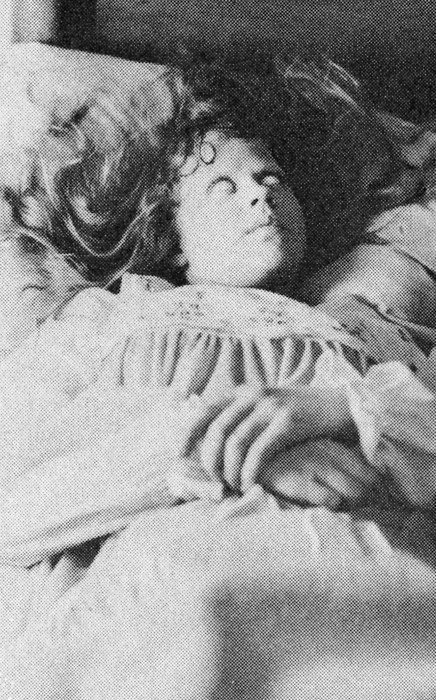
Thomas describes his ministry as one of healing. “I don’t do exorcisms on demand,” he said. “It’s dangerous, and it’s not always what people need.
“I have to get to the root cause of what they’re suffering from — it is preternatural or psychological,” he said.
“In every instance I am called into, there is deep suffering,” Thomas said. “In most instances, it is not demonic, it’s a mental health issue. But either way, our church has a responsibility to help these people.”
In the seven years he’s been an exorcist, Thomas has worked with a dozen cases of possession among about 125 inquiries.
He counts three of the individuals as “delivered.” He is still working with another three. The others started the process but did not finish.
“My message to people is that Satan is real, demonic possession is real -- it’s not superstition, not myth, not medieval,” he said. “But the church has remedies.”
Thomas had been a priest for 22 years when his bishop of the Diocese of San Jose, Calif., asked if he would learn about exorcism. Not every diocese is required to have a priest trained in exorcism.
Thomas went to Rome on a sabbatical to study spirituality and took a class on the topic. He went deeper, studying with an Italian exorcist. A classmate from his class asked if he would be willing to share his experiences for a book.
The story of his internship inspired the book “The Rite” (2009), which was made into a movie released in 2011 starring Anthony Hopkins, who played the veteran priest. One marked difference in the film is that Thomas’ character is shown as a seminarian rather than an established priest.
“I couldn’t have told you seven years ago that I was called to do this,” Thomas said. “But I do believe in the personification of evil. I’m not afraid, and I believe that is a grace.
“I don’t find the work appealing![]() , but in the same breath, I find it meaningful.”
, but in the same breath, I find it meaningful.”
Thomas used the $25,000 consulting fee from the film to start a fund to help those he sees when they need a referral for mental health or medical services and don’t have insurance.
Being an Exorcist is
REAL BUSINESS
Exorcism is the stuff of movies, but for the Rev. Gary Thomas, it is a Catholic rite. He is an exorcist, trained in the Vatican and Rome, and his story inspired a book and a 2011 film.
Thomas describes his ministry as one of healing. “I don’t do exorcisms on demand,” he said. “It’s dangerous, and it’s not always what people need.
“I have to get to the root cause of what they’re suffering from — it is preternatural or psychological,” he said.
“In every instance I am called into, there is deep suffering,” Thomas said. “In most instances, it is not demonic, it’s a mental health issue. But either way, our church has a responsibility to help these people.”
In the seven years he’s been an exorcist, Thomas has worked with a dozen cases of possession among about 125 inquiries.
He counts three of the individuals as “delivered.” He is still working with another three. The others started the process but did not finish.
Thomas had been a priest for 22 years when his bishop of the Diocese of San Jose, Calif., asked if he would learn about exorcism. Not every diocese is required to have a priest trained in exorcism.
Thomas went to Rome on a sabbatical to study spirituality and took a class on the topic. He went deeper, studying with an Italian exorcist. A classmate from his class asked if he would be willing to share his experiences for a book.
“My message to people is that Satan is real, demonic possession is real -- it’s not superstition, not myth, not medieval,” he said. “But the church has remedies.”
The story of his internship inspired the book “The Rite” (2009), which was made into a movie released in 2011 starring Anthony Hopkins, who played the veteran priest. One marked difference in the film is that Thomas’ character is shown as a seminarian rather than an established priest.
“I couldn’t have told you seven years ago that I was called to do this,” Thomas said. “But I do believe in the personification of evil. I’m not afraid, and I believe that is a grace. - Keep reading this story
Via: Greenville Online
Maxim Model Killed by Female Hitman

MESSED UP:
MAXIM MODEL KILLED BY
FEMALE "JAMES BOND"
The 21-year-old was strangled in 2008, but just-released court documents claim the attack was driven by a failed business deal between her father and an ex-boyfriend.
The ex is believed to be Lebanese physician and businessman Munir Uwaydah.
After her father pulled out of a pharmaceutical deal on doubts of Uwaydah’s legitimacy, the latter allegedly "dispatched" Kelly Soo Park to "confront" Julianna Redding.
Prosecutors allege that Park, officially his real estate broker and financial assistant, was nicknamed “James Bond,” and served as Uwaydah’s “debt collector.”
Reading between the lines, she often intimidated business partners of Uwaydah’s in at least two previous incidents involving her then-boyfriend, racecar driver Ronnie Case.
Juliana Redding, an aspiring model and actress who died years ago, may have been killed by a female debt collector nicknamed “James Bond" and hired as “muscle."
One incident involved intimidating a bank manager over an investment scheme, another a horse breeding business and $350,000 collection, CBS News reports.
Uwaydah has since fled the country and is believed to be living in Lebanon.
Another source says he allegedly only hired Park to “intimidate and threaten” Redding, not to murder her, while Park has been tied to the murder scene via “forensic evidence."
By: Fred Britney
Source: Hollywood Gossip
Ruben Ubiera - An Urban Narrative
“I want to capture an unspoken language between our generation and the world of art” explains Ruben Ubiera. His language in “Urban Narrative” at 101/Exhibit in Miami consists of abstract, bold, bright, geometric shapes and lines combined with life-like depictions of gorillas.
“I have a clear use of the line and depict ideas in a very figurative and graphic way. It is also very conceptually driven. Each painting is a conversation starter, a catalyst for interactivity,” explains Ubiera and adds “My work is an urban narrative from my search for objects to turn into art, to the ideas and concepts. My observations always tell a story.”
As a South Florida artist Ubiera is inspired by the eclectic cultural mix of Miami. His Dominican heritage shapes his aesthetics and visual vocabulary and his experiences of life in New York and Miami add an urban point of view.
Ubiera’s work has made an impact on the Miami art scene via various exhibitions, murals and public art projects. Signed to the Michael Margulies Artist Agency he has a strong presence in the gallery world, he was voted “Street Artist of the Year” by the Miami New Times, has recently collaborated with the Museum of Contemporary Art and the North Miami Police Department on an installation and has created public art for the city of Pembroke Pines and Hollywood.
The gorilla has become a signature object in Ubiera’s work. It recurs in many different variations and was also the central element of the work in “Urban Narrative.” The artist conceptually developed the gorilla as a metaphor for the street art invasion of the gallery space.
“ It is the art that everyone is seeing on the streets, but no one wants to let it in. It's huge, strong, smart, witty, serious and funny at the same time. You may want to say that it's just brute force and vandalism, but there's more than meets the eye. It represents the art movement that it's currently shaping up in Wynwood at a local level and globally in so many other cities.”
Ubiera’s apes invaded 101/Exhibit for “Urban Narrative” in paintings and mixed media installations using repurposed materials such as spray cans, cardboard, newspaper and skateboards. Each object has a previous story that becomes part of the art work and the dialogue and part of the unspoken language that Ubiera uses in his continuous quest to “find beauty in the balance of form and line.”
Text by Heike Dempster
Photos by Robert Dempster
Guerra de la Paz - Power Ties
|
Julian Navarro proudly presents Power Ties a solo exhibition by Guerra de la Paz.
“POWER TIES is an exploration into the effectiveness of both symbolism and satire as methods of communicating the unmentionable, with the objective to create a visual language that depicts scenes where the ethics and morals of the influential are narrated by irony and righteousness.
Guided by historic relevance and society’s structure of power, the work depicts the height of civilization and the cause of its decline in a dialogue of rudimentary ideals conceptually embellished with a passementerie of controversy.
|
|
Guerra de la Paz |
Power Ties
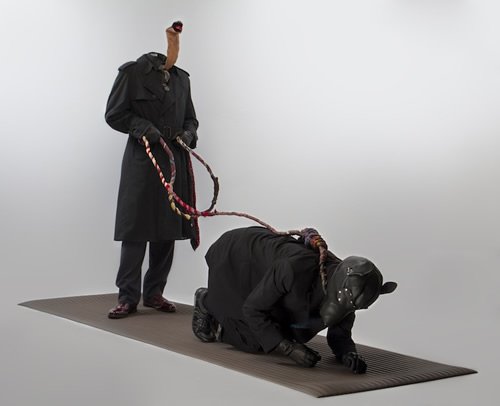
Man’s Best Friend, 2011
Mannequin on stand, found garments and shoes, men’s neckties, wire, carpet runner
82 x 82 x 48 in.
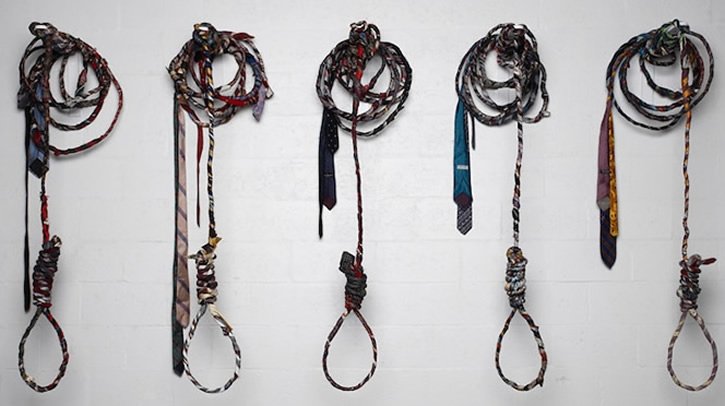
Monday through Friday, 2005
Men’s ties wire and aluminum wall brackets
Size variable
Assertive yet gentile in its delivery, POWER TIES provides comedic relief to a subject that delves into the darkest depths of the preeminent topics of the status quo and engages the viewer with humorous portrayals of a treacherous, high stakes game where underhanded deception is splendiferously rewarded.
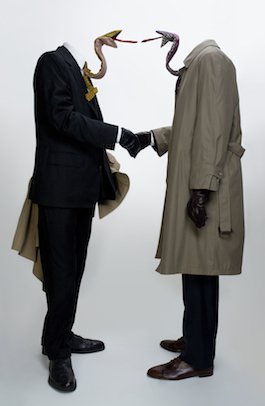
Personified by empty shells of clothing that appear to be void of human control and stylized to identify with the affluent and authoritative image of success, POWER TIES offers settings that illustrate the physically nonexistent nature of a ubiquitous dominion and its consequential stronghold on society in a story line characterized by neckties that represent unscrupulous misdeeds and the sacrifices one makes for personal gain”… Guerra de la Paz.
Guerra de la Paz is the composite name that represents the creative team efforts of Cuban born artists, Alain Guerra (Born: 1968 Havana, Cuba) and Neraldo de la Paz (Born: 1955 Matanzas, Cuba. Live and work in Miami, Florida) and have been consistently producing collaboratively since 1996.
Sealing the Deal, 2009
Mannequin on stand, found garments and shoes, men’s neckties, wire
82 x 48 x 36 in.
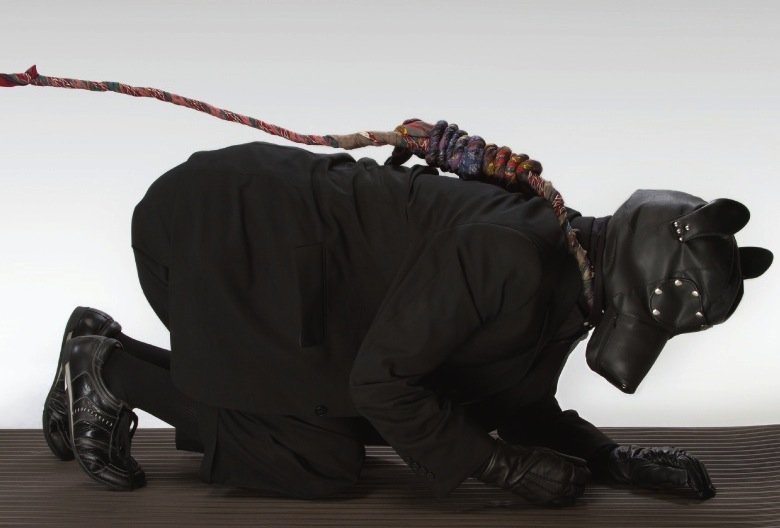
November 3 - December 15, 2012
Opening Reception November 3 | 6-10pm
Julian Navarro Projects
36-01 36th Ave. Long Island City, NY 11106
Their work has been exhibited in museums, galleries and art fairs as well as other unconventional venues internationally, including: The Saatchi Gallery - London, Miami Art Museum, Art Museum of the Americas - Washington DC, Americas Society - NYC, Chicago Cultural Center, 21c Museum, Louisville, KY, Southeast Center for Contemporary Art, Winston-Salem, NC, John Michael Kohler Arts Center, WI, El Museo Universitario de el Chopo - Mexico City, The Prague Quadrennial of Performance, Design and Space - CZ, and most recently, Federation Square - Melbourne AU.
For further information, please contact Julian Navarro at [email protected] or by telephone at 718 532 8767.
Flexibility
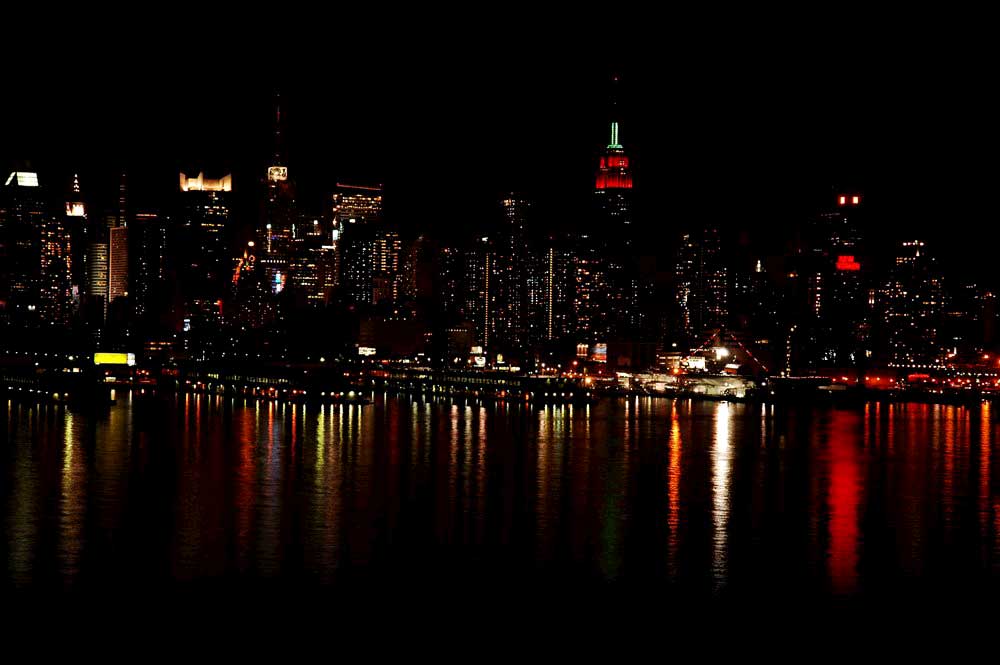
FLEXIBILITY
YOUR LIFE IS LIKE A DANCE,
CONSTANTLY IN A NATURAL AND HARMONIOUS FLOW.
YOU ARE OPEN TO LISTEN, OPEN TO LEARN AND OPEN TO ADAPT YOURSELF TO WHATEVER IS NEEDED AT EACH MOMENT.
Greatest Debate of All Time
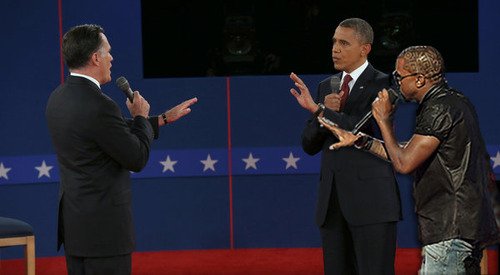
Yo President Obama, Govenor Romney...I'm really happy for this debate. I'ma let you finish but Jefferson vs Hamilton was the greatest debate of all time!
Save the Earth!

Gangnam Style with Wolverine
Ice Cream in the Shape of a Flower

A FLOWER
IS ALWAY BETTER AS ICE CREAM.
FL Couple Sex in Restaurant, Won't pay Bill
Orlando police said Tom Murphy, the manager at Paddy Murphy's restaurant in Orlando, called police after Jeremie Calo, 32, and his date were seen having sex on their table out on the patio while other patrons, including children, were eating in the same area, WKMG-TV, Orlando, reported Wednesday.
Murphy said the couple stopped when he called police, but officers arrested Calo for fighting with the manager and refusing to pay his $101 bill.
The couple were not charged for the alleged public sex because none of the other restaurant patrons wanted to write statements for police.
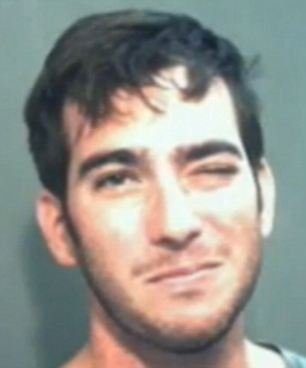
Restaurant Sex? Really?
Police in Florida say they arrested a man accused of fighting with a restaurant manager after having sex with his date on a table in front of other patrons.
Via: UPI
Win 1,000 Business Cards
Howdy

Howdy & welcome to PeterSean.video.

howdy@petersean.com

Worthy of

Let Terror be a Treat.

Halloween wraps fear in innocence,
As though it were a slightly sour sweet.
Let terror, then, be turned into a treat...
- Nicholas Gordon
Katy Deen
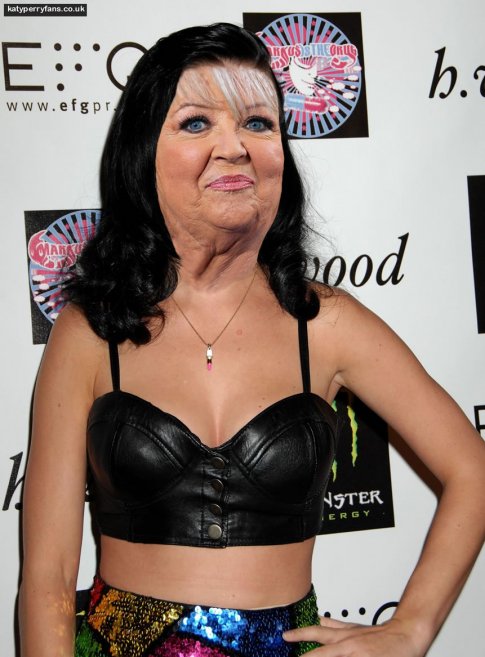

Wannabe Batman from Michigan Arrested
Super Asshole?
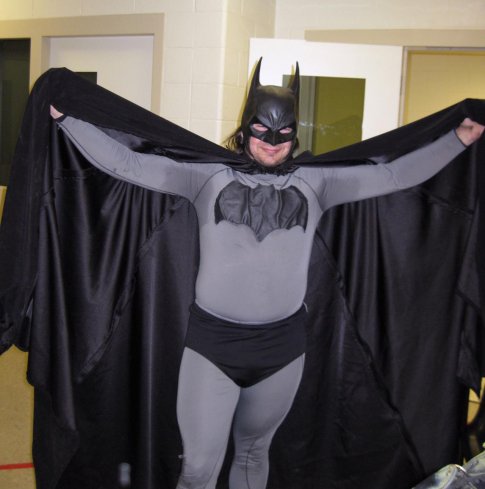
"He wouldn't clear the scene, and we had a canine out there and he kept screwing up the scent," State Police Sgt. Jeff Gorno told the Petoskey News-Review (http://bit.ly/QFv0yh ). "He said he wanted to help us look for the driver."
"We didn't want the dog to track Batman instead of the accident scene, and he was getting in the way of officers who had a job to do," the sergeant said.
Williams wasn't carrying any dangerous weapons, but his costume and gear were confiscated, Gorno said. He was charged with resisting and obstructing police in an investigation, and he posted bond and was released from the county jail. He is due back in court Oct. 18.
A call to a number listed as Williams' Petoskey home rang unanswered Wednesday.
It's not Williams' first brush with the law as the caped crusader.
He was arrested last year after police received a report of a man dressed as Batman on the roof of a Petoskey business. When officers arrived, they found Williams, dressed as Batman and carrying a baton-type striking weapon, a can of chemical irritant spray and a pair of sand-filled gloves.
'Batman' charged with obstructing Michigan police
PETOSKEY, Mich. (AP) — The search for a driver who fled an accident scene in northern Michigan over the weekend was apparently a job for a dog, not a bat.
State troopers arrested 33-year-old Mark Wayne Williams because they say he refused to leave them alone after he showed up Saturday night wearing a Batman outfit.
Source: AP
Japanese Bunny


Let's Move
to Japan
